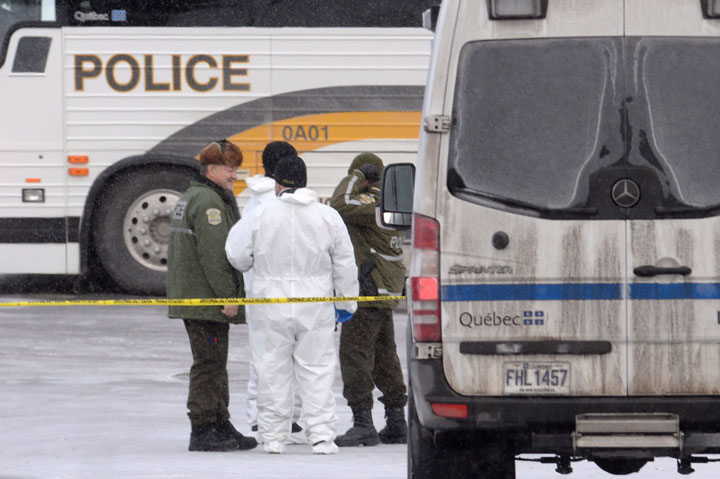Alexandre Bissonnette has been charged with first-degree murder and attempted murder in relation to the shooting at a mosque near Quebec City that left six people dead Sunday night.

But, despite the prime minister and others immediately calling the case a terrorist attack, Bissonnette was not charged with terrorism.
“The charges that have been laid are those that were disclosed by the evidence so far,” said Michel Fortin, with the office of the Director of Public Prosecutions in Quebec. “It’s an ongoing investigation but as of now, the only charges that could be laid were those that were laid.”
READ MORE: Alexandre Bissonnette charged with 6 counts of 1st degree murder
The missing evidence, said Lorne Dawson, a professor of sociology and legal studies at the University of Waterloo, is likely something about the suspect’s motive for the crime.
“A terrorist act is one committed in whole or in part for a religious or ideological purpose, objective or cause,” he said, quoting the Criminal Code.
“So that’s what needs to be determined: is to what extent was this act motivated by an ideological cause or was it personal?”
“Those two things can be blended, and Crown attorneys have to parse it out and figure, ‘Do we have enough evidence that this individual was mainly radicalized to a cause, and that they understood they were undertaking that act in service of their cause?’”
Legally-speaking, it’s a fine line between a terrorist act and a mass shooting, like a school shooting, he said.
“It is a real grey area.”
Public Safety Minister Ralph Goodale had no doubts while speaking to reporters Monday afternoon. “This was an act of extreme violence, directed against a particular group, with the clear intent to intimidate and harm that group and to strike fear in their hearts,” he said. “In the definition in broad terms of terrorism, they were trying to inflict terror. That fits the definition.”
But David MacAlister, associate professor and director of the School of Criminology at Simon Fraser University, isn’t sure that this case yet meets the full definition of terrorism. While the intention to intimidate was likely there, he said, “until we find out what the motivation or purpose was behind the attack, in my opinion it is premature to label it a terrorist act.”
Right now, thinks Dawson, police are searching for something that proves the crime was committed for a political, ideological or religious purpose. “They will be combing through his social media and they will be interviewing people, and they will be looking for statements he’s made. They’ll catalogue what he’s been watching, downloading, his track record in consumption of material. And then it’s really going to depend really heavily on his statements.”
Many terrorists freely confess that their crime was politically-motivated, he said. “Because that’s the reason why they did it: to draw attention to their cause.”
Practically, he said, it makes little difference in terms of eventual sentencing if a person is convicted of multiple murders or terrorism. “He’s accused of six murders. The consequences of that are going to be exactly the same as being charged with terrorism.”
He wonders though why politicians were so quick to label it a terrorist attack. “What is the public significance of identifying something as an act of terrorism?”
MacAlister thinks it would have been better if they waited. “I’m not sure why everyone is so quick to jump the gun on labeling mass killings as terrorist acts. I suspect terrorism is on the forefront of the mind for a great number of government officials,” he said. “I think it would be prudent for more people to wait at least until a preliminary investigation has been conducted to look into the background of these suspects before attributing any motive to their actions.”






Comments